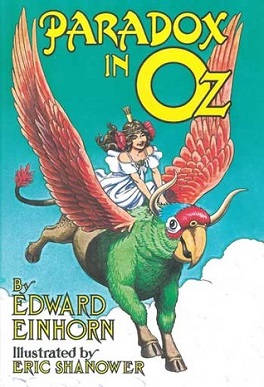Paradox in Oz
 |
|
| Author | Edward Einhorn |
|---|---|
| Illustrator | Eric Shanower |
| Cover artist | Eric Shanower |
| Country | United States |
| Language | English |
| Series | The Oz Books |
| Genre | Fantasy |
| Publisher | Hungry Tiger Press |
|
Publication date
|
1999 |
| Media type | Print (Hardcover) |
| Pages | 237 pp. |
| ISBN | |
| OCLC | 44424711 |
| LC Class | PZ7.E34445 Par 1999 |
Paradox in Oz is a 1999 novel written by Edward Einhorn. As its title indicates, the book is an entry in the series of books about the Land of Oz written by L. Frank Baum and a host of successors.
Paradox in Oz was published by Hungry Tiger Press, with illustrations by Eric Shanower. It was playwright Einhorn's first novel and first Oz book. (His second in both categories, The Living House of Oz, would appear in 2005.) The publication of Paradox in Oz was timed to coincide with the centennial of the original Oz book, The Wonderful Wizard of Oz (as was also true of Gina Wickwar's The Hidden Prince of Oz and Dave Hardenbrook's The Unknown Witches of Oz). Einhorn's novel was warmly received and widely praised upon its initial publication, as were Shanower's illustrations; a review in Asimov's Science Fiction called it a "gorgeous book."
In Paradox in Oz Einhorn maintains a fidelity to the benign utopian fantasy of Baum's Oz novels, though he also acknowledges the darker revisionist vein explored in contemporary books like Geoff Ryman's Was and Gregory Maguire's Wicked trilogy. Einhorn constructs an alternate, dystopian version of Oz, an Obsidian City in contrast to Baum's Emerald City.
Einhorn's book is also notable for its use of science fiction elements, principally time travel. There is a science fiction thread that winds through Baum's work, manifested in non-Oz books like The Master Key but also in the Oz stories, with robots (Tik-Tok of Oz), domed cities (Glinda of Oz), and other features. Critics have remarked on the interest in and acceptance of technology that sets Baum's Oz apart from earlier fantasy domains.
...
Wikipedia
